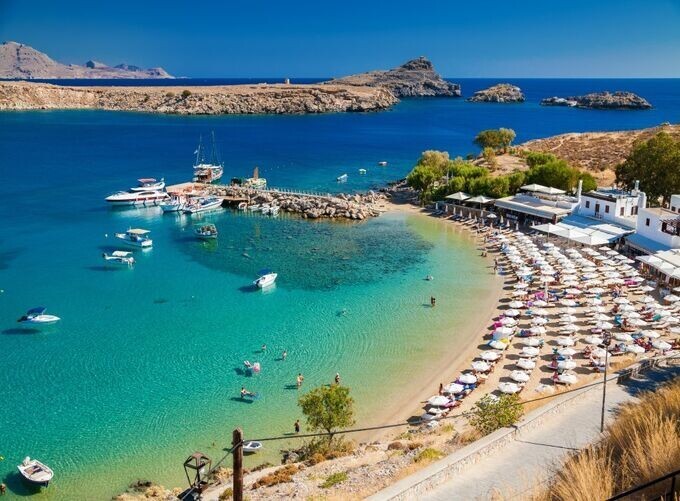
Greece Weather in February
Introduction
Greece, with its rich history, stunning landscapes, and vibrant culture, is often seen as a summer destination. However, visiting Greece in February offers a unique perspective on the country, allowing travelers to experience its beauty without the usual crowds. In this comprehensive guide, we will delve into the weather conditions in Greece during February, providing insights into what to expect, the activities you can enjoy, and tips for making the most of your winter trip.
Section 1: General Climate Overview in Greece
Climate Zones in Greece
Greece is characterized by a Mediterranean climate, which means hot, dry summers and mild, wet winters. However, due to its diverse topography, the country can also experience varying weather patterns. Generally, Greece can be divided into several climate zones:
- Coastal Areas: Including popular destinations like Athens, the Peloponnese, and the islands, these regions enjoy milder winters compared to the mainland.
- Inland Areas: Northern regions like Thessaloniki and mountainous areas experience colder temperatures.
- Islands: The islands, especially those in the south like Crete and Rhodes, tend to have milder winters compared to the mainland.
Average Temperatures in February
In February, Greece is transitioning from winter to early spring. Here’s a breakdown of average temperatures across different regions:
- Athens: Average highs around 14°C (57°F) and lows around 7°C (45°F).
- Thessaloniki: Average highs around 10°C (50°F) and lows around 4°C (39°F).
- Crete: Average highs around 15°C (59°F) and lows around 9°C (48°F).
- Santorini: Average highs around 13°C (55°F) and lows around 8°C (46°F).
Precipitation and Humidity in Greece
February is one of the wetter months in Greece, particularly in the western parts of the country. Average rainfall varies but can reach around 60-90 mm (2.4-3.5 inches) in many areas. Coastal regions may experience more rain, while inland areas may be drier.
Section 2: Regional Weather Patterns in Greece
Athens
Athens, the capital, experiences mild winters with occasional rain. February is generally cool, with a mix of sunny and cloudy days. The Acropolis and other outdoor sites are less crowded, making it a pleasant time for sightseeing. Although there might be occasional rain, many days are clear, providing beautiful views of the city and surrounding hills.
Activities in Athens
- Cultural Events: February is an excellent time to explore Athens' rich cultural offerings. The city hosts various art exhibitions and performances.
- Sightseeing: Visit Greece's iconic landmarks like the Acropolis Museum, the Parthenon, and the Ancient Agora without the usual tourist crowds.
Thessaloniki
Thessaloniki, located in northern Greece, tends to be cooler than Athens in February. While the weather can be brisk, it is generally manageable for outdoor exploration. The city’s vibrant culture, historical sites, and culinary scene make it an attractive destination.
Activities in Thessaloniki
- Culinary Experiences: February is perfect for indulging in local cuisine. Consider taking part in a food tour to taste authentic dishes like moussaka and baklava.
- Cultural Festivals: Thessaloniki hosts various events, including the International Documentary Festival, which attracts filmmakers and enthusiasts alike.
The Islands: Santorini, Crete, Mykonos
While the mainland experiences cooler temperatures, the Greek islands hopping, especially Crete and Santorini, enjoy relatively mild weather. Although it may be too chilly for swimming, these islands offer a serene and picturesque setting for exploration.
Activities in the Islands
- Santorini: Explore the charming villages of Oia and Fira. The sunsets here are renowned, and fewer tourists mean you can enjoy them more peacefully.
- Crete: Visit historical sites like the Palace of Knossos and the charming town of Chania, where you can stroll through the beautiful old harbor.

Section 3: Activities and Events in February in Greece
Cultural Events
February in Greece is a time of vibrant cultural activities. The highlight of the month is Apokries, the Greek Carnival, which begins in February and culminates with a series of festivities leading up to Lent. Major cities like Athens and Thessaloniki host parades, parties, and various events filled with music and dance.
Local Festivals and Celebrations
- Thessaloniki Carnival: Known for its lively atmosphere, this festival features traditional costumes, music, and parades. It’s an excellent opportunity to immerse yourself in local culture.
- Athens' Apokries: Experience street parties, elaborate costumes, and various performances across the city.
Outdoor Activities in Greece
While many may associate Greece with summer beach activities, February offers a unique chance to explore the outdoors:
- Hiking: The cooler temperatures make for pleasant hiking conditions. Trails in regions like Mount Olympus or the Pindus mountain range can be explored without the summer heat.
- Skiing: For those interested in winter sports, Greece has several ski resorts, such as those near Kalavryta and Mount Parnassus.
Indoor Activities in Greece
February is also a good time to enjoy Greece’s rich indoor offerings:
- Museums: Greece is home to some of the world's most important archaeological museums. Take the opportunity to explore the National Archaeological Museum in Athens or the Museum of Byzantine Culture in Thessaloniki.
- Cooking Classes: Participate in a cooking class to learn about Greek cuisine. Many classes include market tours where you can purchase fresh ingredients.
Section 4: Travel Tips for February in Greece
Packing Essentials
When traveling to Greece in February, packing appropriately is crucial:
- Clothing: Layering is key. Pack warm clothing, including sweaters, a waterproof jacket, and comfortable walking shoes. Don’t forget a warm hat and scarf, especially for the northern regions.
- Accessories: Bring an umbrella or waterproof bag to protect against unexpected rain.
Travel Considerations
Traveling in February can be different from the peak tourist season:
- Transportation: While ferries between islands may operate less frequently, domestic flights are still available. Check schedules in advance to plan your itinerary.
- Accommodation: Many hotels offer lower rates during this period. Booking in advance can ensure you find the best options.
Section 5: Pros and Cons of Visiting Greece in February
Pros
- Fewer Tourists: Enjoy a more authentic experience without the crowds.
- Lower Prices: Take advantage of off-peak pricing for accommodations and activities.
- Unique Cultural Experiences: Participate in local festivals and events that showcase Greek traditions.
Cons
- Unpredictable Weather: Be prepared for rain and cooler temperatures.
- Limited Accessibility: Some attractions may have reduced hours or be closed for maintenance during the off-season.
Greek islands: adventure, relaxation, mesmerizing sunsets.
Visiting Greece in February offers travelers a unique opportunity to explore the country in a different light. With milder weather, fewer tourists, and rich cultural experiences, it’s an ideal time for those seeking a more intimate journey. From the historic streets of Athens to the beautiful islands, Greece in February is filled with potential for adventure and discovery.



